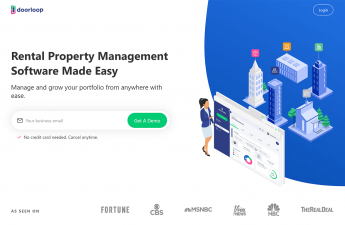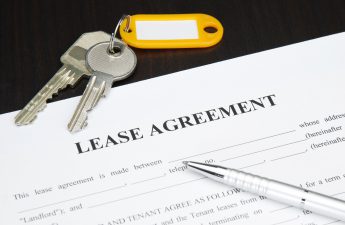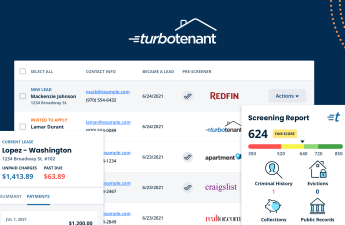Why Homeowners Insurance isn’t Enough for Your Rental Property
Homeowners and landlords alike all know that they need insurance for their properties. What many landlords don’t realize though is that once they start renting out their property, it’s better to get a dedicated landlord insurance policy for rental properties rather than sticking with a homeowners insurance policy. But most don’t understand the difference between them, or why it matters as long as you have coverage.
When it comes to insurance, it’s crucial that you have the right coverage. You don’t want to be underinsured as that can put you in a devastating situation should you need to make a claim, but you also don’t want to be overinsured and pay for coverage that isn’t relevant to your current situation. This is why getting a customized landlord insurance policy is so vital for everyone who rents out their properties.
What is the Difference between landlord insurance vs homeowners insurance?
Homeowners insurance and landlord insurance are both types of property insurance that can protect your investment in a property. However, there are some key differences between the two policies. Homeowners’ insurance typically covers the structure of the property as well as the belongings of the occupants. In contrast, landlord insurance typically just covers the structure of the property.
Landlord insurance also typically includes liability coverage in case a tenant is injured on the property, while this may be an optional add-on for homeowners insurance. As a result, it’s important to choose the right type of policy based on your needs.
So what exactly is covered under landlord insurance?
Landlord insurance typically includes coverage for the dwelling, other structures on the property, liability, and loss of temporary rental income. Landlord insurance typically consists of two main parts: property and liability. The property part naturally protects the property itself, while the liability part protects you in case there is an accident on the premises where either a tenant or the guest of a tenant ends up getting injured.
Under property coverage you will normally find:
- Building limits
- Wind/hail coverage
- Water damage
- Additional coverage such as ordinance or law, water and sewer backup, employee dishonesty, forgery, electronic data, etc.
Under liability you will normally find:
- Occurrence and aggregate limit
- Medical expenses
- Certified terrorism
- Damages to premises rented to you

What does landlord insurance not cover?
Landlord insurance typically does not cover intentional damage done by the tenant, such as vandalism. If the tenant accidentally damages the property, landlord insurance will likely cover the repair costs.
Landlord insurance also usually does not cover theft by the tenant, unless the theft is a result of a forced entry (such as a break-in).
Lastly, landlord insurance does not cover your tenant’s personal belongings; for that the tenants will need to get renters insurance. It’s highly advisable for landlords to recommend tenants to get renters insurance, but you cannot legally force your tenant to buy coverage unless you will add this to your rental agreement. Be aware though that this may intimidate some renters, even though it’s in their best interest.
What is the Difference between landlord insurance vs Rent Guarantee insurance?
Landlord Insurance
Landlord insurance protects the landlord when the building or property suffers damage, such as from fire, theft, flood, etc. A standard landlord insurance policy often includes loss of rent, protecting landlords from monetary loss if the property becomes uninhabitable. However, some insurance providers offer it separately as loss of rent insurance.
Typically, landlord insurance also includes liability coverage in case a renter is injured on the property. All landlords usually have this coverage on their buildings. However, it doesn’t cover a tenant that doesn’t pay rent. It also doesn’t cover any intentional damage done by the renter, such as vandalism. However, if the tenant accidentally damages the property, landlord insurance will likely cover the repair costs. You also do not receive coverage for theft by the tenant, unless the theft is a result of a forced entry (such as a break-in). Moreover, this insurance isn’t for you if you own and live in a home and rent out a room in that home.
Keep in mind that landlord insurance isn’t the same as homeowners insurance. Standard homeowners insurance usually does not cover rental activity or related risks. So if you want protection from the financial impact of property damage and liability, you need landlord insurance.
Rent Guarantee Insurance
Rent guarantee insurance, also called rent default insurance or rental income loss insurance, is a risk management solution that protects the landlord if a tenant defaults on their rent payment or is unable to pay for reasons out of their control, such as job loss, relationship turmoil, cash flow problems, or military deployment. This type of insurance pays the monthly rent for a set period if the covered renter stops making payments.
The coverage depends on how the insurer assesses the risk of non-payment for each tenant. The insurance company will run its own screening and background checks on each renter before determining the premium to insure the renter, if at all. For instance, the insurer is likely to reject an application to protect rental payments if a renter has a history of defaulting on payments. Moreover, the tenant will need to have a steady job in order to qualify for such a policy.
Rent guarantee insurance is a relatively new type of product, which is why most landlords don’t have it. It is an excellent tool to protect you against damage done by tenants or their pets, unpaid rent, and lease breaks. It also offers eviction protection, helping landlords with legal fees when they have to evict a tenant. You can protect your cash flow by financing maintenance costs and ensuring on-time rent deposits.
However, there are a few cases where rent guarantee insurance won’t cover unpaid rent, including a landlord’s failure to comply with the tenancy agreement or keep the property fit to live in.
How much does landlord insurance cost?
Naturally, the cost of getting landlord insurance will vary, but can typically cost anywhere from $500 for an average-sized single-family rental to $4500 for a large single-family rental for example. The main factor when it comes to price is the property itself. By this we mean foremost the value of the property itself, but also the area it’s located in. Regions that are more prone to perils such as windstorms or hail will usually have higher insurance rates.
However, the value of the property will be the main factor for the overall price. The most important part of any type of property insurance will always be replacement costs. If you end up having to completely rebuild the property, you need to make sure your insurance policy will actually cover all the costs of rebuilding. Be aware that market value is NOT the same as replacement costs. Your house may be valued at $500,000 for example, however if you would have to rebuild it from scratch that would most likely cost a lot more.
Another factor is the deductibles. Choosing a higher or lower deductible would also affect the policy, but to a lesser degree than replacement costs. If you have a substantial amount of savings, you might want to consider a higher deductible. But don’t choose a deductible that is so high that you wouldn’t be able to cover the expense yourself.
In addition, there are extra coverages you might want to consider, such as equipment breakdown if your property has very heavy machinery, for example a large central airconditioning, but make sure you don’t add on coverage you’ll never end up needing.
How do you get a quote For Landlord Insurance?
Traditionally, you would get these quotes through an agent or a broker when you obtained the property, or you could leave your details with a carrier who would then get back to you. In recent years, however, there has been a lot of change in the industry. Companies like Honeycomb Insurance will let you get a bindable quote directly on their website, without having to wait on third parties. If you already received a quote through your broker or agent, it may be a good idea to obtain additional quotes through these direct-to-consumer companies.
What is the best Landlord Insurance?
It’s very important to choose a carrier that has an excellent financial rating. If the carrier isn’t rated AM Best “Excellent” or “Superior”, it could mean that the company doesn’t have sufficient capital reserves to pay out claims if needed, which essentially means the policy is useless. If you financed your rental property with a mortgage, an AM Best “Excellent” or “Superior” rated carrier will usually be required by the lender.
You should also never obtain a policy through a carrier that isn’t admitted. Non-admitted insurance companies often fly under the regulation radar, and should only be used as a last resort.
The Best Landlord Insurance Providers
Below is a list of our partners that offer landlord insurance.
1. Obie
Obie offers landlord insurance in all 50 states. So far, it has insured more than $4 billion in property. Obie provides coverage for a variety of property types, such as single-family rentals, condos, duplexes, triplexes, and apartment buildings with more than five units.
Whether your property is vacant, rented out as a short-term rental (like AirBnB), or you’re in the process of renovating or flipping, Obie provides customizable coverage options for landlords. As stated on their website, you can expect to save 25% with Obie on average.
- Obie is an insurance company, specializing and focusing on providing coverage specifically to real estate investors.
- Simple quote request process will match you with the right insurance for your rental.
- Get the coverage you need to protect your investment and save some money for your future investments.
- Strength: Landlord Insurance
2. Steadily
Steadily is a leading provider of comprehensive insurance solutions for landlords. Their landlord insurance policies are designed to provide maximum protection at an affordable price. Steadily’s policies offer a variety of coverage options to fit the specific needs of each landlord, and their customer service team is available to answer any questions and assist with claims.
Some of the key benefits of Steadily’s landlord insurance policies include:
- Comprehensive coverage: Steadily’s policies offer coverage for a wide range of risks, including property damage, liability, loss of rental income, and personal property.
- Customizable policies: Landlords can choose from a variety of coverage options to create a policy that fits their specific needs and budget.
- Affordable pricing: Steadily’s policies are competitively priced to provide maximum coverage at an affordable price.
- Easy claims process: Steadily’s claims process is designed to be quick and easy, with a dedicated claims team available to assist landlords with any questions or concerns.
- Outstanding customer service: Steadily’s customer service team is available to answer questions and provide assistance throughout the insurance process, from selecting a policy to filing a claim.
- Steadily’s policies offer coverage for a wide range of risks, including property damage, loss of rental income, and more.
- Steadily offers affordable landlord insurance across all 50 states.
- Steadily’s policies are competitively priced to provide maximum coverage at an affordable price.
- Strength: Landlord Insurance
3. Azibo
Azibo’s landlord insurance offers property protection against fire, lightning, explosion, or vandalism. It also offers liability protection, covering any legal, medical, or settlement expenses in the event of an injury on the property.
You can also request additional coverage for other structural damage (such as to fences, sheds, or unattached garages), smoke damage, damage to your personal property (such as to furniture, artwork, or stored items), vehicle damage, water and sewer backups, and even loss of rent if your property becomes uninhabitable because of damage.
- Azibo’s core features are free to use, with optional additional services that can be purchased.
- Azibo offers a wide range of coverage options including property protection, liability protection, loss of rents, personal contents, and umbrella coverage.
- Azibo is the only national insurance provider dedicated to rental property owners.
- Save up to 25% on landlord insurance for your portfolio.
- Strength: Complete Solution
4. Honeycomb
Honeycomb’s landlord insurance offers protection against damages from perils like fire, lightning, wind, hail, and electrical/gas malfunctions. It also provides liability protection if someone is injured on your rental property.
On average, Honeycomb’s landlord insurance costs 40% less than typical homeowner insurance. The policy is designed to specifically cover properties that are rented out. It helps to protect you against business income loss if your rental unit becomes temporarily inhabitable.
- Honeycomb is a dedicated insurance program designed for landlords and real estate investors.
- It makes buying insurance for rental properties easy, fast and affordable.
- Honeycomb offers a great alternative to traditional carriers with its proprietary pricing and tech-forward platform.
- Strength: Landlord Insurance
Bottom Line
Properties that are being rented out should always have a dedicated landlord insurance policy.
- Don’t buy a homeowners insurance policy for properties that are being rented out. When you become a landlord, you need the right coverage to protect your property
- Opt for a landlord insurance policy that will give you the most accurate replacement costs – if you need to rebuild your property from scratch, you want to make sure you’ll be 100% covered
- Don’t skimp on liability coverage – as a rule of thumb, always make sure you have at least $1,000,000 in liability coverage.
- Go for the highest deductible you can afford – this will lower your premium rate, and you want to avoid small claims in any case as this will surely increase your rates upon renewal and may even prevent you from getting insurance in the future
- Always buy insurance from a carrier that is admitted and has the financial rating of AM Best “Excellent” or “Superior”
Disclosure: Some of the links in this post are affiliate links and Landlord Gurus may earn a commission. Our mission remains to provide valuable resources and information that helps landlords manage their rental properties efficiently and profitably. We link to these companies and their products because of their quality, not because of the commission.








